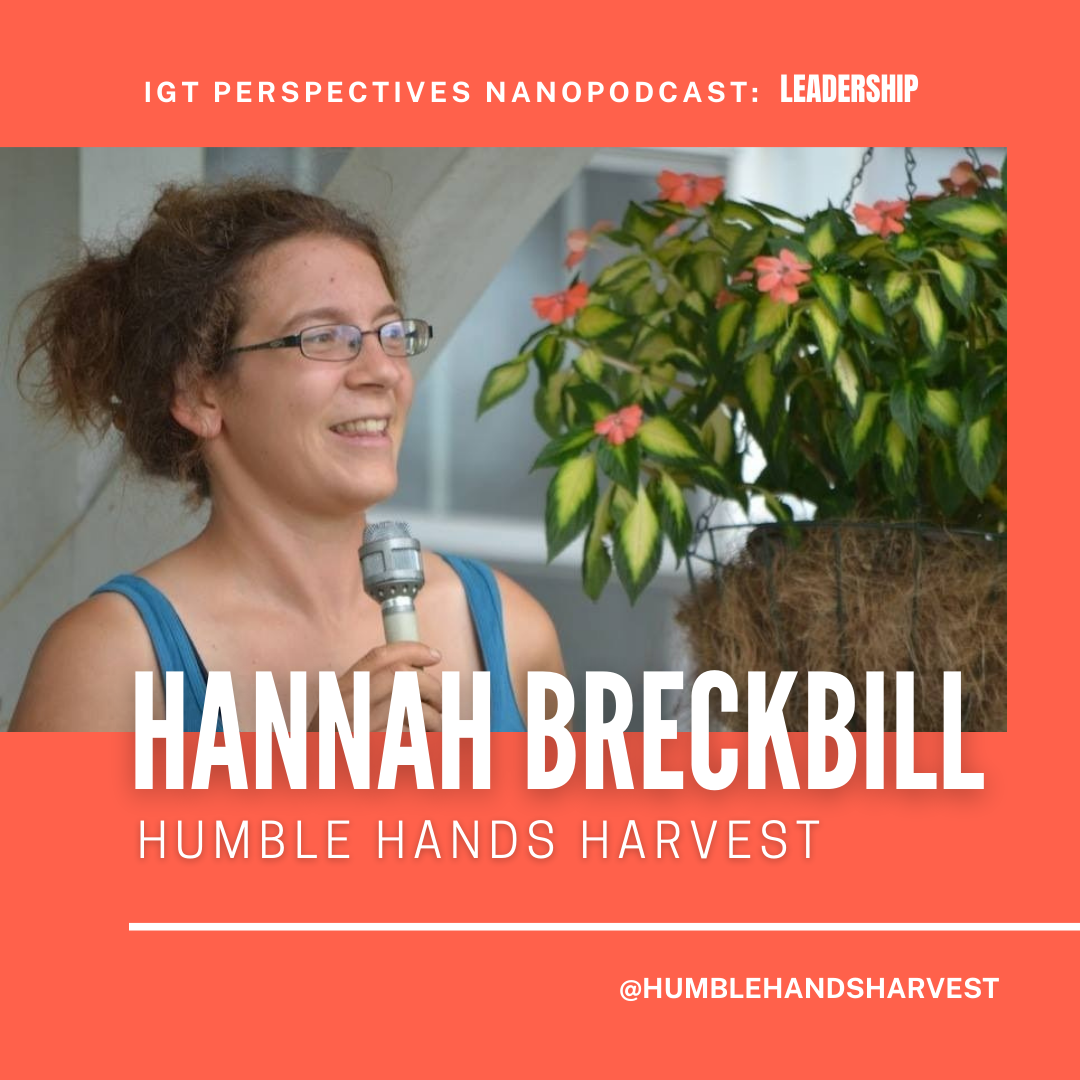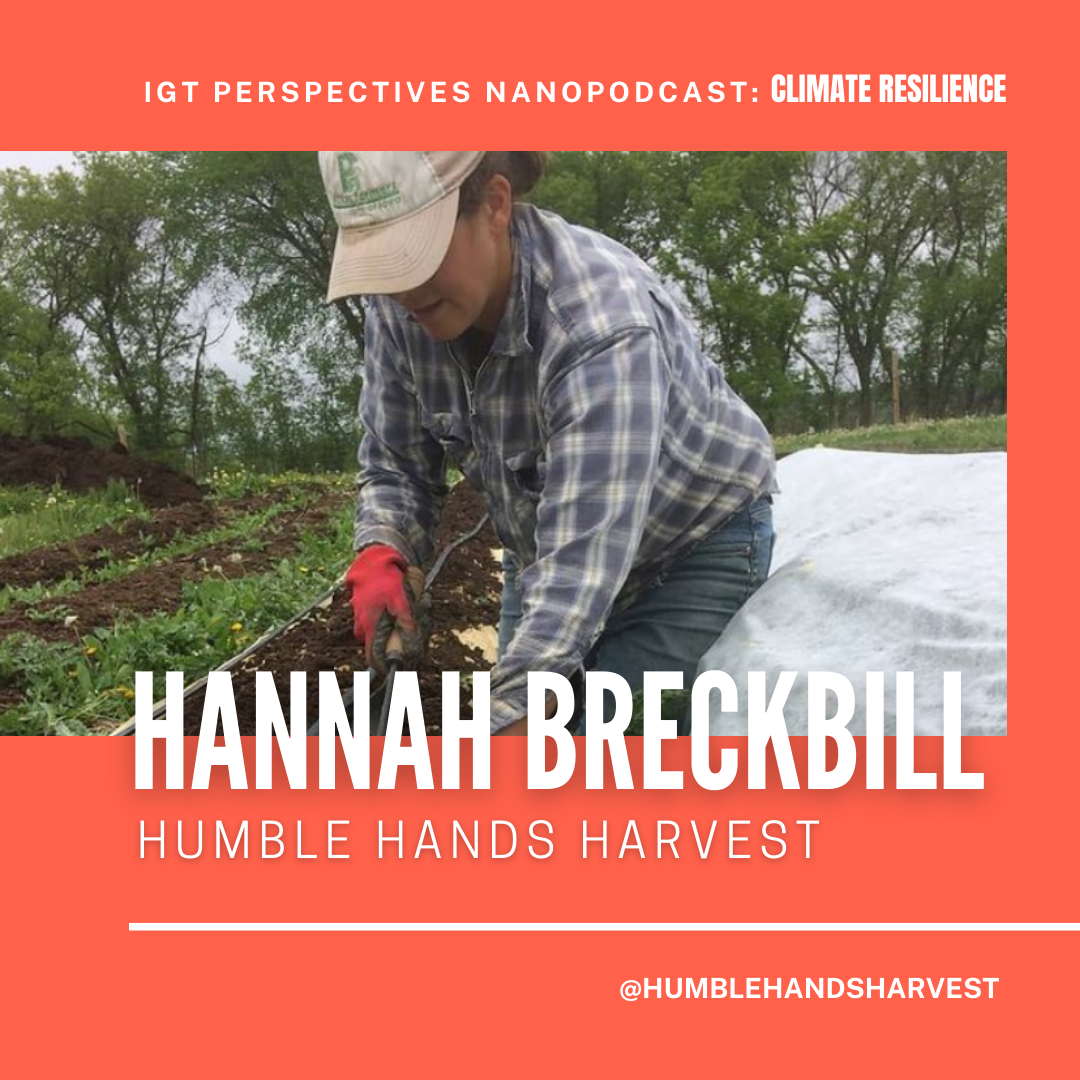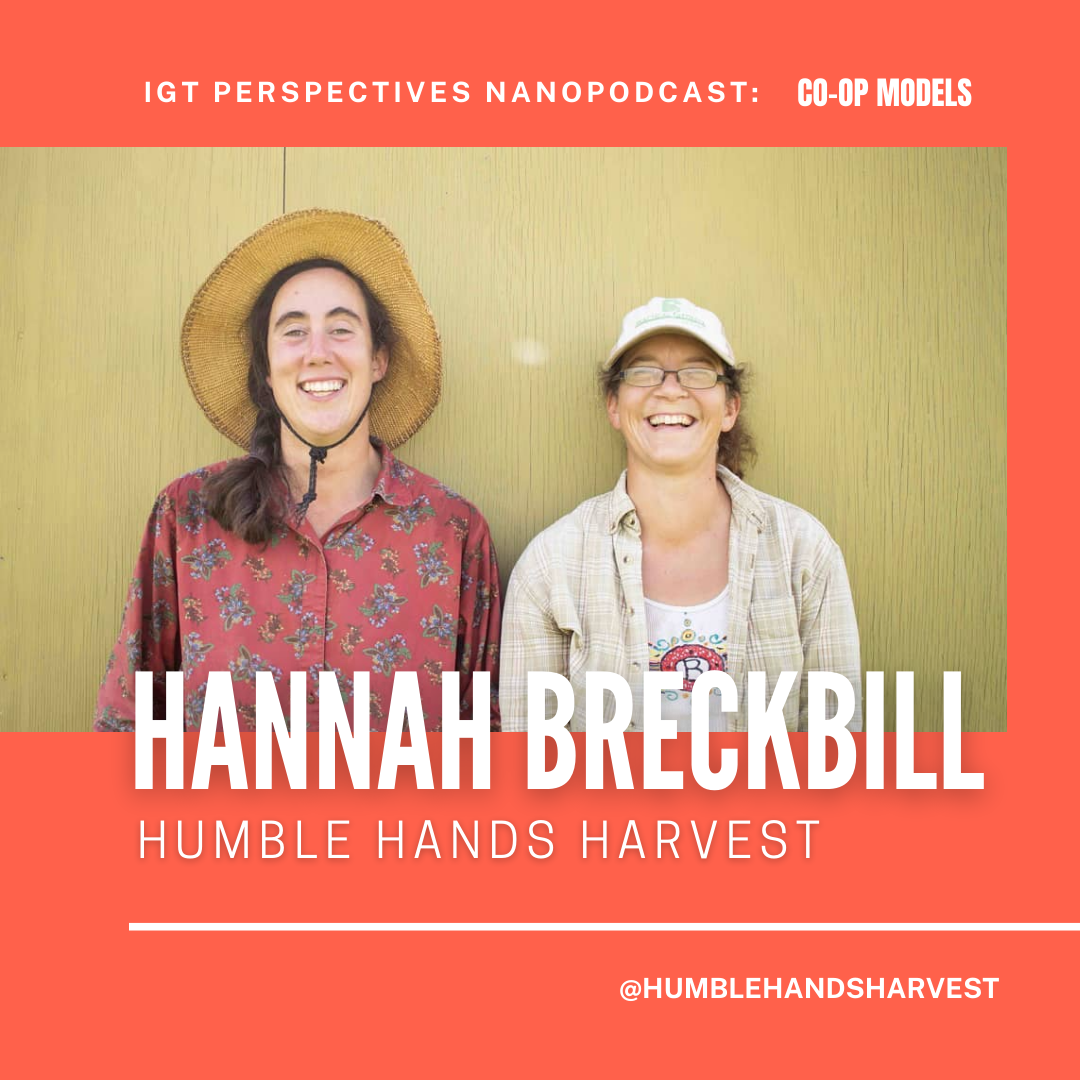The world is full of changemakers. And you might be one too.
Meet Hannah Breckbill of Humble Hands Harvest, a worker-owned co-operative farm in Decorah, Iowa. Humble Hands Harvest is an over two-acre CSA that offers both meat and vegetables.
Hannah and her co-farmer Emily are stewarding their land for future generations through new ownership models and by building healthy resilient soil. They focus their farm around building community including by hosting the Queer Farmer Convergence.
Listen in as Hannah talks about growing as a leader, planning for climate resilience, and building an equitable co-op model in the episodes below.
Subscribe to Perspectives on Apple Podcasts or Spotify for more inspo from food leaders.

Alyssa Martinez Neumann (00:03):
The world is filled with changemakers, and you might be one too.
Maura Paxton (00:06):
Welcome to the nanopodcast, where we serve up bite-sized pieces of inspo from food leaders. We’re your hosts, Maura Paxton.
Alyssa Martinez Neumann (00:14):
And Alyssa Martinez Neumann. You’re listening to Perspectives.
Maura Paxton (00:31):
Today, we talk with Hannah Breckbill.
Hannah Breckbill (00:34):
My name is Hannah Breckbill and my farm is Humble Hands Harvest. I founded Humble Hands Harvest in 2013, but we became a worker-owned co-operative and accessed permanent land in 2017. So I’m a co-farmer, now. There are two member-owners right now.
Maura Paxton (00:49):
As usual, our guest shared their expertise in a snackable five minutes or less. Hannah talks about how farming shaped her into an accidental but passionate leader.
Hannah Breckbill (00:59):
So I’m a queer farmer. I live in a rural space. For many years, I was the only queer person my age that I was aware of in this town — or, one of very few. It’s a very isolating way to be. So I was sad about that at times. I still am. But one of my friends, basically one day after a phone call with her, where I was just crying because I was lonely, she said, “This is what we’re going to do, Hannah. We are going to make you a community of queer farmers. We’re going to start you an Instagram account. You’re going to host the Queer Farmer Convergence on your farm.” And I was like, “Whatever.”
She did it. She started this Instagram account called Queer Dirt, and we just made a convergence happen. I happen to be very happy to host things and to stand in front of groups of people and talk, but I had no thought that it was possible to just gather a group of people so quickly and easily via these social networks. But it happened. And, yeah. It was a beautiful thing. And it’s definitely a needed thing. So that’s the other thing about leadership is, like, I just do what I need. And then it turns out that other people need it too, and so we gather together. Every time we’ve had the Queer Farmer Convergence, which has been twice, we took a year off because of COVID, everyone is just so happy to be with their people. It’s just phenomenal. It’s a really good feeling to be able to create that space.
I’ve noticed myself becoming more of a leader as I’ve become a farmer. I’ve been thinking about that a little bit in the context of, I live in a rural place, a small town that is really fertile ground for leadership. We can do whatever we want to do if we take action in this town. That’s one thing that I really like, and have kind of gravitated toward in the past years that I’ve lived here.
Another thing that I think about with leadership, and myself personally, is that I’m a fairly quiet person, pretty introverted. I actually got into farming because it felt like an activist profession that I could engage in that wasn’t loud, and I didn’t have to be articulate or be able to motivate people or any of that. I could just grow food, and that was important enough. But then as I’ve been a farmer, I find myself becoming more vocal and more of an advocate because of the ways that I’ve seen what we need. Even though we needed many farmers just doing the work of farming, we also need incredible amounts of systemic change in order to enable us to do that work well. That’s kind of what has emerged from my years of farming, is just an understanding that we really need to be leaders and we really need to be vocal and claim what we need, and we need it because the world needs it. Not just because we, as individuals, selfishly need it.
I guess the only thing I’d add is just the amount of naivety in my leadership is actually kind of important. Like, the fact that I just believe that it should be possible to make XYZ change. And because I believe it should be possible — probably there’s white privilege in there, too, because anything you can want can happen. If it should be possible, then we can make it happen. I so believe that, as part of who I am. And it really serves me well as a leader, to imagine that if I can imagine it, then it can be true. It can happen. And it doesn’t… I don’t have to limit myself based on what I think might be feasible according to other people.
Maura Paxton (05:11):
Just to recap, remember this key takeaway from Hannah’s thoughts on leadership. Follow your needs. Other people probably have them, too.
Don’t forget to check out the rest of Hannah’s episodes and subscribe. Be sure to also follow us on Instagram at Oregon Tilth for even more inspo from food leaders.

Alyssa Martinez Newmann (00:03):
The world is filled with changemakers, and you might be one too.
Maura Paxton (00:06):
Welcome to the nanopodcast, where we serve up bite-sized pieces of inspo from food leaders. We’re your hosts, Maura Paxton.
Alyssa Martinez Newmann (00:14):
And Alyssa Martinez Newmann. You’re listening to Perspectives.
Maura Paxton (00:31):
Today, we talk with Hannah Breckbill.
Hannah Breckbill (00:34):
So my name is Hannah Breckbill. My farm is Humble Hands Harvest. I founded Humble Hands Harvest in 2013, but we became a worker-owned cooperative and access to permanent land in 2017. So I’m a co-farmer now. There are two member-owners right now.
Maura Paxton (00:50):
As usual, our guest shared their expertise in a snackable five minutes or less. Hannah talks about how she builds climate resilience both personally and on her farm.
Hannah Breckbill (00:59):
So where we are in Iowa, it seems like the big issues are related to climate change, that we’re seeing now at any rate, are related to rainfall and severe weather — so wind as well as rain. We’re seeing a lot of heavier rainfall, like inches of rainfall in a night as opposed to a gentle half inch over the course of the night. We’re also seeing really long spells without rain. So we just had basically two months with no rain, then was followed up by six inches of rain in a week. So it’s just really volatile in that way.
The resilience that we have to plan for is making sure our soils can handle that kind of shifting. What we’re doing right now is working on a no-till system in our vegetable production. Previously, we’ve been relying on tractor tillage for all of our deep production. It just wasn’t working very well in the spring when we just have to wait and wait and wait to be able to get the tractor to field because it’s just raining and raining and raining.
So a couple of years ago in the spring, I made four no-till beds, just on a whim. We planted all of our spring brassicas into those four beds because they were the only ones that we were able to work that spring. Since then, we’ve been working on developing our system a little bit more and learning how to direct seed like carrots into these beds as well as transplanting. I’m pretty excited about it. I’m pretty excited about what it means for our soil over time to be able to hold its structure, not get turned up once or twice a year and build something really resilient.
So one thing that’s like mental and emotional, and also just very tangible is the fact that I live in a yurt right now. I think during the first year, we had a crazy windstorm, just a blast of 60-mile-an-hour winds that came through for 10 minutes or something like that — but it was just a blast. The yurt tipped probably 10 degrees in. So the wall on the inside knocked over my dresser and some other shelving that was next to the wall because it had tipped in so far. So ever since then, that’s been just like… the fact of the structure that is my home is very vulnerable to wind, makes wind a very scary thing for me. I look at the forecast. The first thing that I look at, most people look at temperature or rain. But my first thing is wind speed. What’s going to be happening? Am I going to have to find a different place to sleep so that I can actually sleep at night and that kind of thing.
Another thing that I think about with getting ready emotionally for climate chaos is in the realm of community, right? We need to know that we can take care of each together. I, as a vegetable farmer, I know my role in climate chaos, right? I know that I’m going to be feeding people, and that’s my job. That feels good to know my role. I feel like a lot of people in the world don’t really understand what their role is yet.
I think a lot about bringing people into understanding the basics of… we need each other for various reasons, and we can be useful to each other. We need good soil, and we need the earth. Sometimes I feel like, because my work is so close to the land and so aware of the weather, maybe I’m sounding an alarm sooner than other people are thinking too. Being the alarm sounder is not actually that fun because people think you’re making a big deal out of something that doesn’t need to be a big deal in their lives or whatever. So I don’t exactly know how to do it, how to get everybody ready, not just myself, but everybody.
Maura Paxton (05:34):
Just to recap, remember this key takeaway from Hannah’s thoughts on climate resilience. Make your plans around the needs of your region. Hannah is planning for shifts specific to Iowa.
Don’t forget to check out the rest of Hannah’s episodes and subscribe. Be sure to also follow us on Instagram at Oregon Tilth for even more inspo from food leaders.

Alyssa Martinez Newmann (00:03):
The world is filled with changemakers, and you might be one too.
Maura Paxton (00:06):
Welcome to the nanopodcast, where we serve up bite-sized pieces of inspo from food leaders. We’re your hosts, Maura Paxton.
Alyssa Martinez Newmann (00:14):
And Alyssa Martinez Newmann. You’re listening to Perspectives.
Maura Paxton (00:31):
Today, we talk with Hannah Breckbill.
Hannah Breckbill (00:34):
So, my name is Hannah Breckbill, and my farm is Humble Hands Harvest. I founded Humble Hands Harvest in 2013, but we became a worker owned cooperative and accessed permanent land in 2017. So I’m a co-farmer. Now there are two member owners right now.
Maura Paxton (00:49):
As usual, our guest shared their expertise in a snackable five minutes or less. Hannah talks about her journey to building a co-op farm model.
Hannah Breckbill (00:58):
So we’re a worker-owned co-operative, and we landed on that model because basically, it felt fair. I’d been farming as Humble Hands Harvest for four seasons, but when Emily joined… Well, the first year that she joined, I still kept a hold of basically all of the risk of the land and infrastructure. And she and I basically partnered on the vegetable operations specifically. And the vegetable operation paid rent to me, Hannah Breckbill, for the land and infrastructure that I provided to it.
I had been farming for four years before that, Emily joined, everyone in the community thought that she was my helper, she was my worker rather than a collaborator. And so that became a really clear point of, we need real clarity around this that we can publicly say, “We are co-farmers. It’s not Hannah’s farm that Emily works for.”
And so, as we were figuring out what the structure was for that, we kind of discovered worker-owned co-operatives. What we wanted was for our work to be what mattered and not for whoever had the most money and most investments in the farm to be what matters. We were working the same huge amount as each other. And so even though I had more capital invested in the farm, didn’t mean that it was more my farm than hers because we were both pouring our whole selves into it. And so the worker-owned co-op structure felt really important. The way it works is that we pay ourselves a monthly basic salary (that’s very much below minimum wage and poverty levels, just to be clear) but we pay ourselves a basic salary every month. And then at the end of the year, within profits that we make, we distribute those based on the amount that we’ve worked.
We keep track of our hours and we make sure that we worked pretty much the same number of hours in a year. So, we just distribute profits evenly that way. But if one of us is working less, we’d kind of prorate that distribution.
As we were figuring out this worker-owned co-op model, we realized that back when we were starting the farm, I had been gifted some of the shares that I used to buy that first eight acres of the LLC. And we had also crowdfunded to be able to put our well in, and we’d raised almost $20,000 from our community and family and friends. So those gifts, they didn’t belong to me specifically, they felt like they belong to the farm rather than me. And so what we did was we created a whole separate element of our worker-owned cooperative, which we call The Commons. And that element holds all of the gifts that this farm has been given. So, what that means is that when I leave the farm, say, when I retire, the farm has to pay me back the money that I’ve invested into the farm. But The Commons, that gift capital stays with the cooperative, with the farm, no matter who’s a part of it.
That makes the gift that we were originally given from our community, it makes it something that we pass on to the next farmers here, no matter what, and they never have to pay us or anybody for access to that gift.
So I’m really excited about that, The Commons. And we’re trying to be clear about it and be able to articulate it well so that people understand it and hopefully are able to adapt it and use it in good ways all over the place. Maybe someday we’ll be able to kind of integrate our concept of The Commons with other folk’s ways of kind of trying to decommodify and take down the price of land. Yeah, it’s all about access, the reason that we are doing this. We want this work to be something that people are able to do, and that money isn’t a limiting part of why people aren’t doing it.
Maura Paxton (05:41):
Just to recap, remember this key takeaway from Hannah’s thoughts on co-op models. Co-op model are not one size fits all. Envision the one that works for you and your collaborators.
Don’t forget to check out the rest of Hannah’s episodes and subscribe. Be sure to also follow us on Instagram at Oregon Tilth for even more info from food leaders.



















